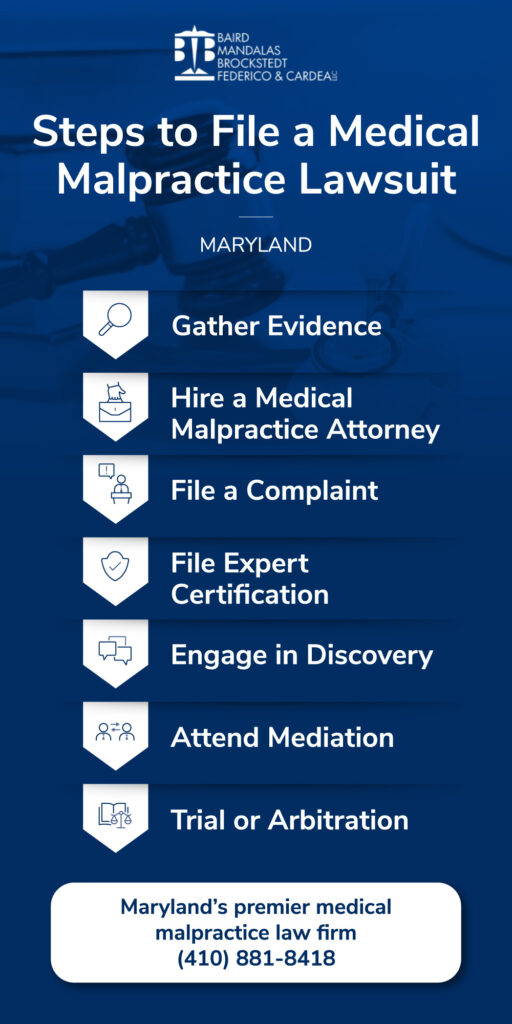
How does a medical malpractice lawsuit work in Maryland? Medical malpractice happens when a healthcare provider makes a mistake that causes harm to a patient.
If this happens to you, you may file a case and seek compensation for your injuries.
Perhaps you’re wondering, How does a malpractice lawsuit work in Maryland? Below, the medical malpractice lawyers at Brockstedt Mandalas Federico, discuss how it works in Maryland. We will go over the steps to file a lawsuit from injury all the way to trial, including details many people miss.
Since most malpractice attorneys work on a contingency basis, they have a substantial investment in your case before they are paid. It is common for malpractice attorneys to cover thousands of dollars of upfront costs before they get paid. This paired with a free consultation should be enough for you to contact a malpractice attorney to determine your future actions. You should consult a medical malpractice attorney to better understand medical malpractice lawsuits.
What Is The Medical Malpractice Definition?
Medical malpractice is the failure of a healthcare provider to provide medical care that meets the acceptable standard in the medical community.
This failure results in injury or death to the patient. Medical malpractice can include surgical mistakes, misdiagnosis, improper treatment, or failure to obtain informed consent before treatment.
To file a medical malpractice lawsuit in Maryland, you must first serve a “notice of intent to sue” on the medical provider. This notice should contain a statement of facts, the legal grounds for your claim, and an affidavit from a qualified medical expert supporting your case.
Proving Medical Malpractice Negligence
So how does a medical malpractice lawsuit work? Most medical malpractice cases rely on the legal standard of negligence. Negligence involves establishing the following:
- Duty of care—a healthcare provider has a duty to provide medical treatment that meets the standard of care in the medical community;
- Breach of duty—the healthcare provider failed to provide this level of care;
- Causation—this failure caused injury to the patient; and
- Damages—losses suffered by the patient as a result of the injury or harm.
All of these elements must be present to prove medical malpractice.
How to Start a Medical Malpractice Lawsuit in Maryland
Perhaps you’d like to know how to start a medical malpractice lawsuit in Maryland. Generally, a medical malpractice case involves the following steps.
1. Seek Medical Treatment
You should seek medical attention immediately as soon as you suspect there might be a problem with the treatment you have received. Medical records are critical evidence in a case.
2. Gather Evidence
You will need to gather evidence to support your case. This may include medical records, witness statements, and expert testimony.
3. Keep an Eye on Deadlines
In Maryland, the deadline, or statute of limitations, for filing a medical malpractice claim is five years from the date of the malpractice or three years from the date that the injury was discovered or should have been discovered, whichever is later.
There are some exceptions to this rule. For example, if the patient is a minor at the time of the malpractice, the statute of limitations doesn’t begin until they turn 18.
4. Hire a Medical Malpractice Attorney
Medical malpractice cases can be complex and require the assistance of an experienced lawyer.
A medical malpractice attorney can help you understand your rights and options, gather and present evidence to support your case, negotiate with the healthcare provider or their insurance company, and represent you at trial.
A medical malpractice attorney can also handle the legal aspects of the case on your behalf, allowing you to focus on your recovery.
5. File a Complaint
Generally, in Maryland, you must file a complaint with Maryland’s Health Care Alternative Dispute Resolution Office (HCADR).
After you file your complaint with HCADR, you have two choices: proceed with arbitration with HCADR or waive arbitration to go directly to court.
You have 60 days to waive arbitration. You must file your lawsuit in court within 60 days of filing your arbitration waiver.
6. File Expert Certification
You must file a certificate from a qualified medical expert within 90 days of filing the initial claim. The qualified expert is typically licensed in the same medical area as the healthcare provider who allegedly committed the malpractice.
The expert must certify that:
- The accused healthcare provider failed to meet the appropriate standard of care and
- This failure caused your injuries.
Your case will be dismissed if you don’t file this certification.
7. Engage in Discovery
Discovery is the process where the parties exchange information and evidence related to the case. This can include documents, witness statements, and expert reports.
Discovery may also involve depositions, interrogatories, and requests for documents.
8. Attend Mediation
Whether you choose arbitration or a lawsuit, you and the healthcare provider will likely attend a mediation session to try and resolve the dispute.
A neutral third party, called a mediator, facilitates the mediation. The mediator will listen to both sides of the case and then attempt to get you and the healthcare provider to settle the dispute.
9. Trial or Arbitration
You will go to trial if you and the healthcare provider cannot settle your case. A trial in the courts of Maryland and an arbitration with HCADR operate differently.
However, in both cases, you and the healthcare provider will present evidence and witnesses. Then, either the court, jury, or arbitration panel will decide on your case.
How Long Do Malpractice Cases Take In Maryland?
How long do malpractice cases take? The length of a medical malpractice case varies depending on the case’s specifics.
Some cases may be resolved relatively quickly, while others may take several years. Below are some factors that can affect a medical malpractice case’s duration.
1. Complexity of Your Case
Medical malpractice cases can be complex, involving extensive medical records and expert testimony. This can prolong the case.
2. Settlement Negotiations
If the parties can reach a settlement agreement, the parties may resolve the case more quickly. However, if the parties cannot agree on a settlement, the case may need to go to trial, which can take longer.
3. Court’s Docket
The court’s docket, or schedule, can also affect the length of a medical malpractice case. If there are many cases ahead of yours, it may take longer for your case to be heard.
Is It Common for Medical Malpractice Lawyers to go to Court?
Medical malpractice lawyers may go to court as part of their representation.
While some medical malpractice cases may be resolved without going to court, it is important to hire an experienced medical malpractice litigator who is ready, willing, and able to take the malpractice case to trial if necessary.
Contact Our Medical Malpractice Attorneys Today
Now that we’ve answered the question, “How does a medical malpractice lawsuit work in Maryland?” you can see, medical malpractice cases in Maryland are complex. You need an experienced medical malpractice attorney who can handle the details of your case so that you can focus on your health.
For decades, the attorneys at Brockstedt Mandalas Federico have provided superior legal services in Maryland medical malpractice claims.
Along with our extensive experience, our clients can expect responsiveness and accessibility to our lawyers. Contact us today.


